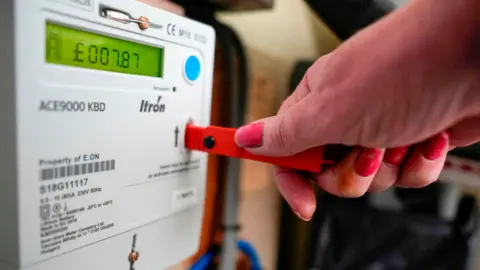In a significant development concerning the energy sector, reports reveal that tens of thousands of customers in the UK are set to receive compensation payouts potentially reaching up to £1,000 each due to the contentious practice of forced meter installations. This initiative comes as a response to a scandal surrounding the unjust transition of vulnerable customers to prepayment meters without their consent.
The compensation framework, which involves energy companies dispersing over £70 million to affected individuals, has been initiated following a thorough review conducted by the energy regulator Ofgem. The inquiry highlighted the inadequacies in how energy suppliers managed the installation of prepayment meters, particularly for customers who were already struggling to keep up with their utility bills.
Energy UK, the trade association advocating for energy providers, emphasized the dedicated efforts of suppliers to remedy the situation since Ofgem’s intervention. They recognized the failure of the existing mechanisms that led to the improper treatment of vulnerable consumers.
According to Ofgem’s findings, eligible customers will receive payments starting at £40, with amounts potentially escalating to £250 or £500, depending on the circumstances surrounding the customer’s treatment by their energy supplier. Notably, substantial payouts, up to £1,000, will be awarded to those who experienced “inappropriate installation” of the prepayment meters. This compensation aims to provide financial relief and address the distress caused to these individuals.
Many customers may have already started receiving assistance or communication from their energy providers regarding the compensation. For those who have not yet heard from their suppliers, Ofgem has confirmed that no further action is required on their part, as compensation will be credited directly into their accounts. The actions taken are in line with the regulator’s commitment to rectify issues faced by improperly treated customers, as underscored by Tim Jarvis, Ofgem’s Director General of Markets.
The controversy traces back two years, coinciding with the peak of the cost-of-living crisis, exacerbated by soaring energy prices linked to geopolitical tensions, notably the Russian invasion of Ukraine. The uproar was particularly pronounced when reports surfaced about agents, particularly from British Gas, forcibly gaining access to the homes of vulnerable individuals to install prepayment methods, either by altering smart meters remotely or installing new prepayment meters on-site without consent.
In response to the mounting evidence of mismanagement, Ofgem took decisive action by halting all forced meter installations in January 2022 and commissioned a comprehensive review that lasted until January 2023. The findings affirmed that suppliers failed to meet the necessary standards in their treatment of customers, which led to the current compensation framework targeting customers from eight specific suppliers, including Scottish Power, EDF, E.ON, and others.
Collectively, these suppliers disbursed nearly £55 million in financial aid ahead of the latest announcements. Alongside the compensation payouts, an additional £5.6 million will be allocated to 40,000 affected customers, while another £13 million will focus on resolving debts linked to forced meter installations.
Amid ongoing enforcement investigations into companies like British Gas, Utilita, and Ovo—affecting tens of thousands more customers—the energy sector is also adapting to new regulations. A stricter code of practice is now mandated to ensure that any future installations of prepayment meters are conducted only with customer consent.
Dhara Vyas, Chief Executive of Energy UK, acknowledged the collaboration between energy firms and Ofgem to meet these regulatory expectations. Nevertheless, she maintained that there are scenarios where forced installations might be justified, especially when prior efforts to resolve debt issues have failed.
In parallel, Dame Clare Moriarty, Chief Executive of Citizens Advice, urged the energy sector to expedite the compensation process for those most impacted by the scandal, reiterating the importance of addressing consumer distress caused by unfair practices.



